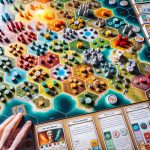The Civilization Board Game Strategy involves skillful planning and decision-making to lead your civilization to victory. In this guide, we will explore the intricate world of the popular tabletop game that challenges players to build their civilizations from ancient times to the modern era.
Designed by renowned game designer Kevin Wilson, the Civilization Board Game captures the essence of Sid Meier’s iconic video game series in a competitive tabletop format. Players will need to utilize resource management, diplomacy, warfare tactics, and strategic thinking to outwit their opponents and emerge victorious in this immersive gaming experience.
As you delve into the world of Civilization Board Game, you will discover the importance of strategy in shaping your civilization’s destiny. From selecting your initial civilization with unique abilities to planning expansion and managing resources efficiently, every decision you make will impact your path to victory. Join us on this journey as we uncover the key elements that will help you master the Civilization Board Game and claim your rightful place as a formidable leader on the board.
Overview of the Civilization Board Game
The Civilization board game is a popular strategy game that allows players to build their own civilizations, develop technologies, manage resources, engage in diplomacy, and compete with other players for victory. In this game, each player takes on the role of a different civilization, each with its own unique abilities and advantages. The goal of the game is to be the most successful civilization by achieving various objectives such as building wonders, expanding territories, and advancing in technology.
To provide an overview of the Civilization board game, it is important to understand the basic components and mechanics of the game. Players start by selecting a civilization and placing their starting units on the board.
Throughout the game, players will take turns performing actions such as exploring new territories, managing resources like food, production, science, and culture, engaging in trade with other players or city-states, conducting research to advance in technology trees, building wonders to gain advantages or bonuses, and engaging in diplomacy or warfare with other civilizations.
In order to succeed in the Civilization board game, having a solid strategy is crucial. Players must carefully plan their actions each turn to maximize their resources and expand their civilization efficiently.
This includes making strategic decisions on which technologies to research first, where to settle new cities for optimal resource management and growth, when to focus on military strength or diplomatic relations with other civilizations. By mastering these strategic elements of the game, players can increase their chances of achieving victory and outwitting their opponents.
Importance of Strategy in Civilization Board Game
In the world of civilization board games, strategy is key to achieving victory. Without a solid game plan, players will find themselves falling behind and struggling to keep up with their opponents. Whether you are a seasoned veteran or a newcomer to the game, understanding the importance of strategy can make all the difference in your gameplay experience.
To excel in the Civilization Board Game, players must carefully consider their every move and decision. This includes anticipation of future developments, allocation of resources, and building a strong empire that can withstand external threats. By formulating a well-thought-out strategy, players can maximize their chances of success and outmaneuver their rivals.
Here are some key strategies to keep in mind when playing civilization board games:
- Prioritize research and technology advancement to unlock powerful abilities and advancements for your civilization.
- Manage your resources efficiently to ensure sustainable growth and expansion.
- Utilize diplomacy wisely to form alliances with other civilizations or engage in strategic warfare when necessary.
- Adapt your strategy based on the abilities and strengths of the civilization you choose to play as.
By honing your skills in these areas, you can become a master strategist in the Civilization Board Game. Remember, victory is not just about luck but also about careful planning and execution of your game plan.
Understanding the Different Civilizations and Their Abilities
In the Civilization board game, one of the key elements that players need to understand to excel in the game is the different civilizations and their unique abilities. Each civilization comes with its own strengths and weaknesses, which can significantly impact your strategy and gameplay. Understanding these abilities is crucial for making informed decisions throughout the game.
Benefits of Different Civilizations
Each civilization in the game offers distinct advantages that can help you progress towards victory. Some civilizations may excel in resource production, allowing you to expand quickly and build a powerful empire. Others may have military-focused abilities that give them an edge in warfare. By choosing a civilization that aligns with your preferred play style or overall strategy, you can maximize your chances of success.
Adapting Your Strategy
Once you’ve chosen a civilization to play as, it’s important to adapt your strategy based on their unique abilities. For example, if you’re playing as a culture-focused civilization, prioritizing cultural advancements and wonders can be beneficial.
On the other hand, if you’re leading a militaristic civilization, focusing on building a strong army and conquering rival civilizations might be more effective. Understanding how to leverage your civilization’s strengths while mitigating its weaknesses is key to developing a winning strategy.
Interactions Between Civilizations
Another aspect to consider when understanding different civilizations in the game is how they interact with each other. Diplomacy plays a significant role in Civilization board game strategy, and understanding how each civilization’s abilities can impact diplomatic relations is crucial. By utilizing diplomacy effectively and forming alliances with certain civilizations while strategically engaging in warfare with others, you can navigate complex political dynamics and ultimately achieve victory in the game.
Resource Management and Expansion Planning
In the Civilization board game, resource management and expansion planning play a crucial role in determining the success of a player’s civilization. Properly managing resources such as food, production, gold, science, and culture is essential for the growth and development of your empire. Without a strategic approach to resource management, players may find themselves falling behind their opponents in key areas.
The Role of Resources
Resources are the lifeblood of any civilization in the game. Food is essential for growing your population and increasing your city’s productivity. Production helps construct buildings and units faster, giving you an advantage in expanding or defending your territory. Gold is important for maintaining your economy and purchasing necessary items. Science allows you to research technologies that can give you an edge over other civilizations, while culture helps improve policies and unlocks powerful bonuses.
Expanding Wisely
Expansion planning involves deciding when and where to settle new cities to maximize resources and control territory effectively. Players must consider factors such as proximity to strategic resources, potential threats from neighboring civilizations, and overall city placement to ensure sustainable growth. Balancing expansion with resource management is key to building a strong foundation for your civilization’s success.
Optimizing Efficiency
To excel in resource management and expansion planning, players must constantly assess their current situation and adapt their strategy accordingly. Prioritizing key resources based on short-term needs versus long-term goals is essential for efficient growth. Being mindful of how each decision impacts your overall strategy can give you a competitive advantage over opponents who overlook the importance of careful planning in Civilization board game strategy.
Diplomacy and Warfare Tactics
When it comes to playing the Civilization board game, diplomacy and warfare tactics play a crucial role in determining the success of a player. Diplomacy involves negotiating with other players, forming alliances, conducting trades, and making deals to further your goals in the game. On the other hand, warfare tactics involve strategically planning military conquests, defending your territories, and engaging in battles to expand your empire and ensure its survival.
One key aspect of diplomacy in the Civilization board game is forming alliances with other players. By working together towards common goals, players can increase their chances of success and establish strong positions on the game board. However, it is essential to tread carefully in diplomatic relations as alliances can easily shift based on each player’s strategic interests. It is important to maintain open communication with other players while also being wary of potential betrayals or backstabbing maneuvers.
On the flip side, warfare tactics require a different set of skills and strategies. Players must carefully plan their military movements, consider troop positioning, anticipate enemy attacks, and make tactical decisions during battles.
Building a strong army, investing in defense structures, and knowing when to strike are all crucial elements of successful warfare tactics in the Civilization board game. Balancing diplomacy with warfare is key to navigating through the complexities of gameplay and ultimately achieving victory in this competitive strategy game.
Advanced Tips and Tricks for Mastering Civilization Board Game
When it comes to mastering the Civilization board game, having a solid strategy in place is crucial for success. One key aspect of a winning strategy is understanding the different civilizations and their unique abilities. Each civilization in the game has its strengths and weaknesses, so it’s essential to tailor your approach based on which civilization you are playing with or against.
For example, some civilizations may excel in science and technology, while others may be more geared towards military conquest. By leveraging the strengths of your chosen civilization and exploiting the weaknesses of your opponents’, you can gain a significant advantage in the game.
Resource management and expansion planning are also vital components of a successful Civilization board game strategy. Properly managing your resources, such as food, production, gold, and culture, can make a huge difference in your ability to grow and develop your civilization.
Additionally, planning out your city placement and expansion strategy is key to securing valuable territories and resources while also maximizing your growth potential. Balancing short-term gains with long-term objectives is crucial for maintaining a stable economy and keeping pace with competing civilizations.
In addition to resource management and expansion planning, diplomacy and warfare tactics play a critical role in achieving victory in the Civilization board game. Building alliances with other players can provide strategic advantages such as trade opportunities or military support when needed.
On the flip side, knowing when to engage in warfare and how to effectively conquer enemy territories is essential for expanding your influence and securing victory. By mastering these aspects of gameplay while also leveraging advanced tips and tricks, you can increase your chances of emerging victorious in the highly competitive world of Civilization board gaming.
| Civilization | Unique Ability |
|---|---|
| Rome | Legions – Units build roads; cities receive production bonus |
| Egypt | Burial Tombs – Bonus happiness from burial tombs; wonders cost less production |
Conclusion
In conclusion, mastering the Civilization board game requires a combination of strategic thinking, resource management, diplomacy, and warfare tactics. As discussed throughout this article, having a solid understanding of the different civilizations and their unique abilities is crucial for success. Players must carefully plan their expansion, allocate resources efficiently, and adapt their strategies based on the ever-changing dynamics of the game.
Moreover, diplomacy plays a significant role in Civilization board game strategy. Forming alliances with other players can provide valuable benefits while knowing when to engage in warfare is equally important. Balancing these two aspects effectively can make or break a player’s chances of victory.
To truly excel at Civilization board game strategy, players must continuously hone their skills, learn from each game experience, and stay adaptable to different situations. By implementing the tips and tricks discussed in this article and putting it all together cohesively, players can increase their chances of emerging victorious in this challenging but rewarding game of civilization-building and conquest.
Mastering this game is not just about luck but about strategic planning and decision-making that will ultimately lead to domination on the board.
Frequently Asked Questions
Is Civilization a Strategy Game?
Civilization is often categorized as a strategy game due to its focus on empire-building, diplomacy, and warfare. Players must make decisions to manage resources, expand territory, and interact with other civilizations.
What Is the Best Strategy for Civilization 6?
The best strategy for Civilization 6 can vary depending on the player’s preferred playstyle and the type of victory they are aiming for. However, focusing on early expansion, establishing strong relationships with city-states, managing resources efficiently, and adapting to changing circumstances are generally good strategies to follow.
How Long Is Civilization Board Game?
The length of a game of Civilization board game can vary depending on the number of players and their experience level. On average, a game can last anywhere from 2 to 4 hours. Factors such as decision-making speed, negotiation between players, and the complexity of each turn can all impact the overall duration of the game.

I love playing all kinds of games – from classics like Monopoly to modern favourites like Ticket to Ride.
I created this blog as a way to share my love of board games with others, and provide information on the latest releases and news in the industry.





